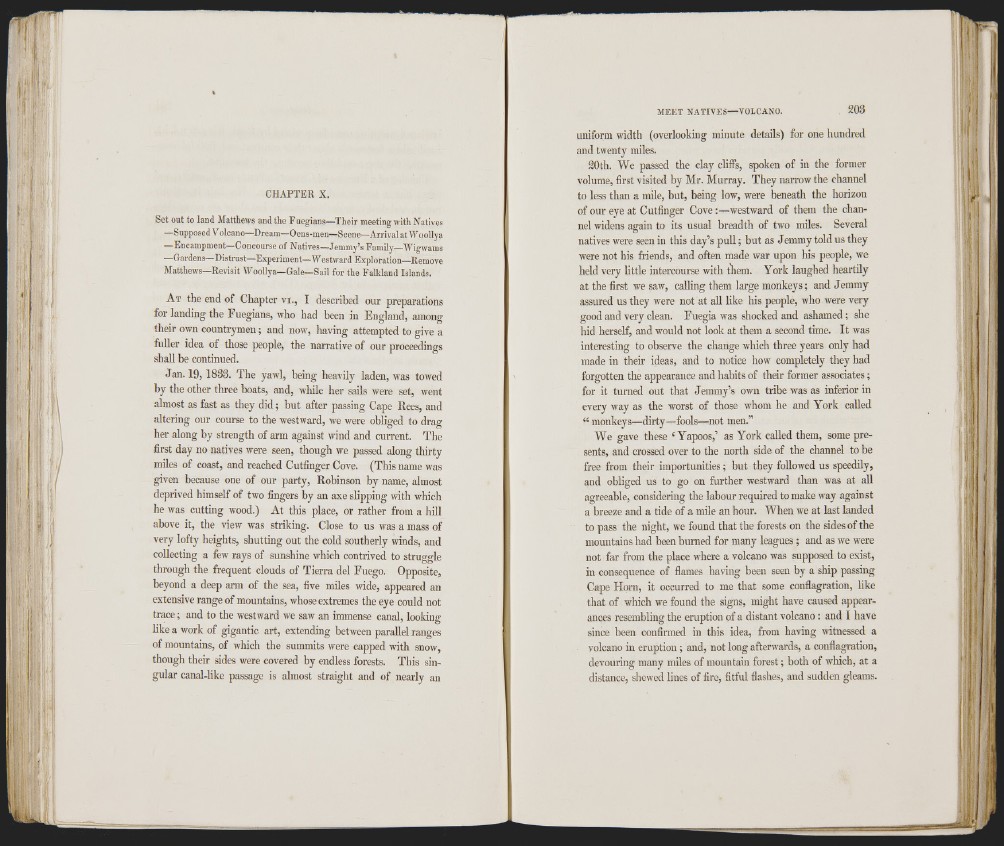
i )
)
i Ml
C H A PT E R X.
Set out to land Matthews and the Fuegians—T heir meeting with Natives
—Supposed Volcano—Dream—Oens-men—Scene—Arrival at Woollya
—Encampment—Concourse of Natives—Jemmy’s Family—Wigwams
—Gardens—Distrust—Experiment—Westward Exploration—Remove
Matthews—Revisit Woollya—Gale—Sail for the Falkland Islands.
A t the end of Chapter v i . , I described our preparations
for landing the Fuegians, who had been in Fngland, among
their own countrymen; and now, having attempted to give a
fidler idea of those people, the narrative of our proceedings
shall be continued.
Jan. 19, 1833. The yawl, being heavily laden, was towed
by the other three boats, and, while her sails were set, went
almost as fast as they did; but after passing Cape Rees, and
altering our course to the westward, we were obliged to drag
her along by strength of arm against wind and current. The
first day no natives were seen, though we passed along thirty
miles of coast, and reached Cutfinger Cove. (This name was
given because one of our party, Robinson by name, almost
deprived himself of two fingers by an axe slipping with which
he was cutting wood.) At this place, or rather from a hill
above it, the view was striking. Close to us was a mass of
very lofty heights, shutting out the cold southerly winds, and
collecting a few rays of sunshine which contrived to struggle
through the frequent clouds of Tierra del Fuego. Opposite,
beyond a deep arm of the sea, five miles wide, appeared an
extensive range of mountains, whose extremes the eye could not
trace; and to the westward we saw an immense canal, looking-
like a work of gigantic art, extending between parallel ranges
of mountains, of which the summits were capped with snow,
though their sides were covered by endless forests. This singular
canal-like passage is almost straight and of nearly an
uniform width (overlooking minute details) for one hundred
and twenty miles.
20th. We passed the clay cliffs, spoken of in the former
volume, first visited by Mr. Murray. They narrow the channel
to less than a mile, but, being low, were beneath the horizon
of our eye at Cutfinger Cove :—westward of them the channel
widens again to its usual breadth of two miles. Several
natives were seen in this day’s p u ll; but as Jemmy told us they
were not his friends, and often made war upon his people, we
held very little intercourse with them. York laughed heartily
at the first we saw, calling them large monkeys; and Jemmy
assured us they were not at all like his people, who were very
good and very clean. Fuegia was shocked and ashamed; she
hid herself, and would not look at them a second time. I t was
interesting to observe the change which three years only had
made in their ideas, and to notice how completely they had
forgotten the appearance and habits of their former associates;
for it turned out that Jemmy’s own tribe was as inferior in
every way as the worst of those whom he and York called
“ monkeys—dirty—fools—not men.”
We gave these ‘Yapoos,’ as York called them, some presents,
and crossed over to the north side of the channel to be
free from their importunities; but they followed us speedily,
and obliged us to go on further westward than was at all
agreeable, considering the labour required to make way against
a breeze and a tide of a mile an hour. AVhen we at last landed
to pass the night, we found that the forests on the sides of the
mountains had been burned for many leagues ; and as we were
not far from the place where a volcano was supposed to exist,
in consequence of flames having been seen by a ship passing
Cape Horn, it occurred to me that some conflagration, like
that of which we found the signs, might have caused appearances
resembling the eruption of a distant volcano : and I have
since been confirmed in this idea, from having witnessed a
volcano in eruption ; and, not long afterwards, a conflagration,
devouring many miles of mountain forest; both of which, at a
distance, shewed lines of fire, fitful flashes, and sudden gleams.
I ■ i
!*
if,
1